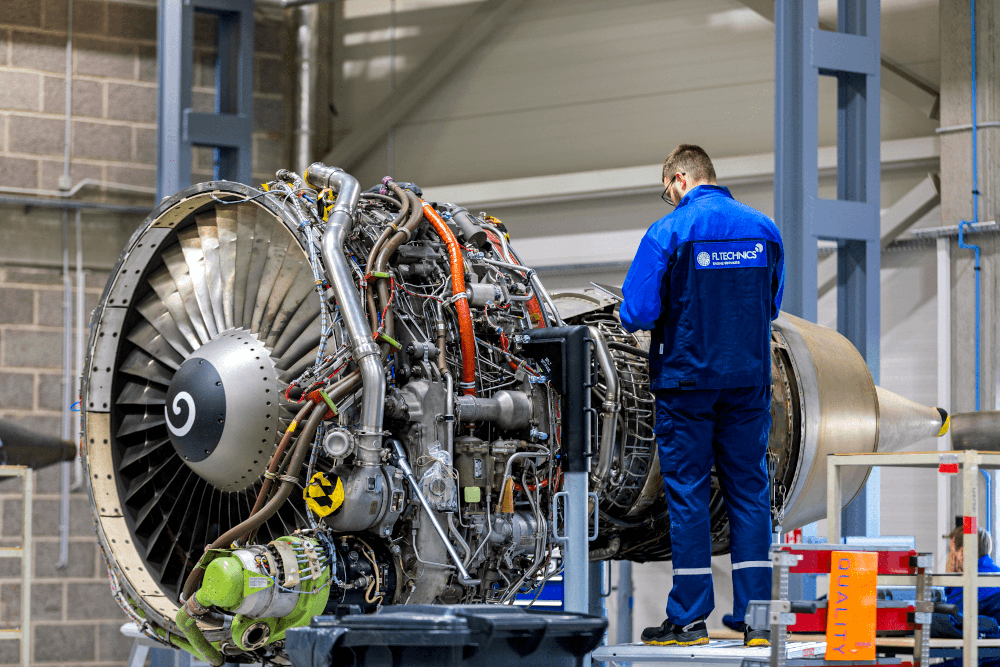
FL Technics says manpower is harder to acquire across its European operations than its facility in Asia-Pacific.
WARSAW—Access to skilled labor is unanimously seen as the primary challenge in Central and Eastern Europe’s MRO segment, according to aftermarket specialists in the region.
At Aviation Week’s MRO BEER conference in Warsaw last week, in a discussion around regional dynamics and developments, four regional industry leaders unanimously agreed that a shortfall in the supply of labor is the key challenge for an industry looking to capitalize on post-COVID demand increases.
“The biggest challenge for us is manpower and the right number of the people with the right skills in the right place to find them,” says Piotr Kaczor, CEO of Avia Prime, a holding group which operates several MRO facilities in Poland, Serbia, and Slovenia additionally provides line maintenance in Montenegro, Macedonia and Kosovo. The facilities have around 34 slots to maintain Airbus, Boeing, Embraer, CRJ and ATR aircraft.
Kaczor says Avia has around 2,500 employees across its businesses and did not let anyone go during the COVID-19 crisis. But with demand for MRO services now much bigger than it was during the pandemic, Kaczor considers acquiring and retaining skilled labor a bigger issue than other challenges, such as parts supply and logistics, because it is very much a longer-term problem. “With people it's not so easy because we are not able to train them from nothing to fully skilled in a short period,” he adds.
Lithuania-headquartered FL Technics, which operates facilities at its main base in Lithuania and in the UK, Germany and Indonesia, is seeing manpower challenges in Europe but not in the Asia-Pacific region. “The only place where we do not see any problems with the manpower is Indonesia,” says FL Technics CEO Zilvinas Lapinskas. He adds that Indonesia has around 20 different colleges and universities that produce more than 3,500 ready-to-work engineers per year. “[Indonesia] is a good location for doing business because if I need 100 engineers, I can get them next week. If I needed 200, this will take two to three weeks, but there is enough manpower there for us,” he says.
In Western Europe, where Lapinskas says Germany and the UK have similar labor-related challenges, the latter has been made more complicated by Brexit. “It's an additional headache because to bring people from abroad to the UK is now very complicated and takes time with all the processes and procedures,” he says.
Vector Group, an aviation holding group based in Tel Aviv, is also seeing labor as a primary challenge for the region. The company operates four companies in four locations: Bulgarian airline Electra Airways, Bulgarian MRO provider ETG Maintenance, Ireland-based leasing company Maverick Horizon and Classic Air, a charter and ACMI company based in Malta. Matvey Koloturskiy, the company’s deputy CEO, cites labor followed by shortages of spare parts and extended lead times as the group's main challenges. “We have to be very creative to find ways on how to deal with that on an everyday basis,” he says of the labor issue.
Koloturskiy says the company has worked to develop an internal program to examine how to attract employees and keep them through career pathways and internal benefits. It has also focused on creating an MRO hub of its own in Varna, Bulgaria and plans to establish a presence in Burgas, setting it apart from the majority of Bulgaria’s MRO companies, which are based in Sofia, the country's capitol.
Vector Group company Electra Airways operates an MRO subsidiary along with several line stations across Europe and it received delivery of its ninth aircraft earlier this month. Sergey Gorbunov, chief operating officer at Electra Airways, says the labor shortage is particularly challenging for the airline as it looks to establish further line stations across Europe, since pilots and technicians are difficult to find. “We are opening new bases regularly, and when doing this we have to organize maintenance arrangements for ourselves at the stations,” he says.
Should Electra have its own manpower shortages in line maintenance when setting up these line stations, Gorbunov says it would alternatively look to source people from third parties who, in turn, may also be experiencing the same labor shortages. Describing the shortfall of engineers as “a black hole,” Gorbunov also believes retention is a major challenge. “We do have some experienced engineers, but unfortunately to attract young people it is quite complicated nowadays and there are challenges around keeping them with us,” he adds.





